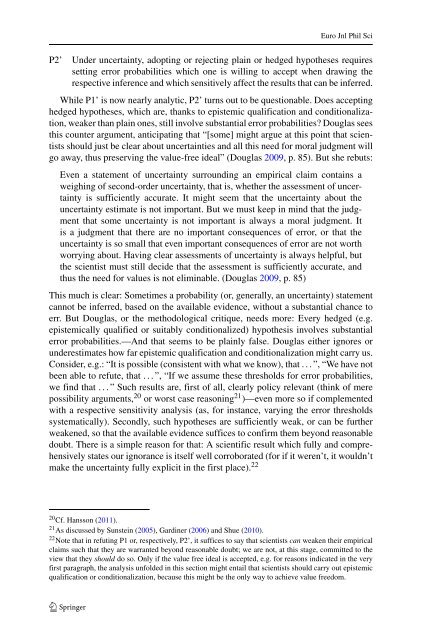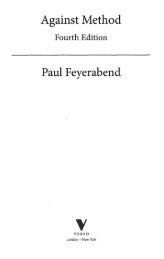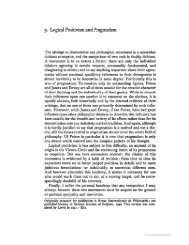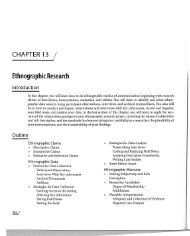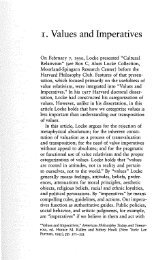In defence of the value free ideal
In defence of the value free ideal
In defence of the value free ideal
- No tags were found...
You also want an ePaper? Increase the reach of your titles
YUMPU automatically turns print PDFs into web optimized ePapers that Google loves.
EuroJnlPhilSciP2’ Under uncertainty, adopting or rejecting plain or hedged hypo<strong>the</strong>ses requiressetting error probabilities which one is willing to accept when drawing <strong>the</strong>respective inference and which sensitively affect <strong>the</strong> results that can be inferred.While P1’ is now nearly analytic, P2’ turns out to be questionable. Does acceptinghedged hypo<strong>the</strong>ses, which are, thanks to epistemic qualification and conditionalization,weaker than plain ones, still involve substantial error probabilities? Douglas seesthis counter argument, anticipating that “[some] might argue at this point that scientistsshould just be clear about uncertainties and all this need for moral judgment willgo away, thus preserving <strong>the</strong> <strong>value</strong>-<strong>free</strong> <strong>ideal</strong>” (Douglas 2009, p. 85). But she rebuts:Even a statement <strong>of</strong> uncertainty surrounding an empirical claim contains aweighing <strong>of</strong> second-order uncertainty, that is, whe<strong>the</strong>r <strong>the</strong> assessment <strong>of</strong> uncertaintyis sufficiently accurate. It might seem that <strong>the</strong> uncertainty about <strong>the</strong>uncertainty estimate is not important. But we must keep in mind that <strong>the</strong> judgmentthat some uncertainty is not important is always a moral judgment. Itis a judgment that <strong>the</strong>re are no important consequences <strong>of</strong> error, or that <strong>the</strong>uncertainty is so small that even important consequences <strong>of</strong> error are not worthworrying about. Having clear assessments <strong>of</strong> uncertainty is always helpful, but<strong>the</strong> scientist must still decide that <strong>the</strong> assessment is sufficiently accurate, andthus <strong>the</strong> need for <strong>value</strong>s is not eliminable. (Douglas 2009, p. 85)This much is clear: Sometimes a probability (or, generally, an uncertainty) statementcannot be inferred, based on <strong>the</strong> available evidence, without a substantial chance toerr. But Douglas, or <strong>the</strong> methodological critique, needs more: Every hedged (e.g.epistemically qualified or suitably conditionalized) hypo<strong>the</strong>sis involves substantialerror probabilities.—And that seems to be plainly false. Douglas ei<strong>the</strong>r ignores orunderestimates how far epistemic qualification and conditionalization might carry us.Consider,e.g.:“Itispossible(consistentwithwhatweknow),that...”,“Wehavenotbeen able to refute, that ...”, “If we assume <strong>the</strong>se thresholds for error probabilities,we find that ...” Such results are, first <strong>of</strong> all, clearly policy relevant (think <strong>of</strong> merepossibility arguments, 20 or worst case reasoning 21 )—even more so if complementedwith a respective sensitivity analysis (as, for instance, varying <strong>the</strong> error thresholdssystematically). Secondly, such hypo<strong>the</strong>ses are sufficiently weak, or can be fur<strong>the</strong>rweakened, so that <strong>the</strong> available evidence suffices to confirm <strong>the</strong>m beyond reasonabledoubt. There is a simple reason for that: A scientific result which fully and comprehensivelystates our ignorance is itself well corroborated (for if it weren’t, it wouldn’tmake <strong>the</strong> uncertainty fully explicit in <strong>the</strong> first place). 2220 Cf. Hansson (2011).21 As discussed by Sunstein (2005), Gardiner (2006) and Shue (2010).22 Note that in refuting P1 or, respectively, P2’, it suffices to say that scientists can weaken <strong>the</strong>ir empiricalclaims such that <strong>the</strong>y are warranted beyond reasonable doubt; we are not, at this stage, committed to <strong>the</strong>view that <strong>the</strong>y should do so. Only if <strong>the</strong> <strong>value</strong> <strong>free</strong> <strong>ideal</strong> is accepted, e.g. for reasons indicated in <strong>the</strong> veryfirst paragraph, <strong>the</strong> analysis unfolded in this section might entail that scientists should carry out epistemicqualification or conditionalization, because this might be <strong>the</strong> only way to achieve <strong>value</strong> <strong>free</strong>dom.


